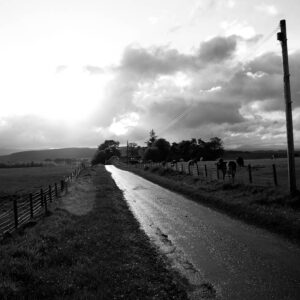


update 26: the Lighthouse
Over these past few months I’ve been too busy working on my latest film, Voyageuse to pay much attention to anything else. So it was a surprise to receive an email from Raymond Strachan at The Lighthouse, Glasgow’s centre for architecture and design, inviting me to screen the film version of The Devil’s Plantation. Raymond previously worked at the Market Gallery and screened the film there in 2014, the last time it was shown in Glasgow. Hard to believe it’s been so long, but for the want of offers
His request was prompted by an object in a vitrine in their current show, Weather Forms, installed by Paul Stallan of Stallen-Brand, an architectural practice based in the city whose reach is both local and international. The object in question is a copy of Harry Bell’s Glasgow’s Secret Geometry that readers of this blog know was the inspiration for this project. Given its rarity – the book’s long out of print – it’s perhaps surprising that it turned up in an exhibition. Or is it?
At the time of its publication in 1984 I was living in London so had no knowledge of Bell’s writing but in Glasgow the book generated a frisson of interest and sold in the hundreds if not thousands. Unlike say, Alfred Wainwright’s Guides, however, as with much creative and cultural endeavour from this overlooked corner of North Britain, Harry’s writings remain obscure and uncelebrated; as such I don’t expect a BBC4 documentary any time soon.
Last week I caught up with Raymond and Paul Stallan, who kindly gave me a quick tour of his exhibition. Many of the images, objects and their underpinning ideas resonated with me, particularly the notion of how weather shapes and influences creative practice. From my experience of making TDP I can testify to that. Certainly there’s something profound about how those raised in Scotland are often affected not only by the dreichness of the climate but also a darkness of the psyche, a condition that found expression in the Scottish Sublime that persists in our collective myths and memories; the legacy of cultural conditioning handed down over generations that, unchecked, makes us hostage to the past and not, I fear, in an affirmative way.
I wouldn’t presume to know what Paul thinks – he’s yet to see the film – but I sense The Devil’s Plantation chimes with many of the themes of his exhibition. It’s for that reason I’ve agreed to screen the film and take part in an informal conversation with him afterwards to explore this terrain in an entertaining way. The event’s on at the The Lighthouse, Mitchell Lane, Glasgow on Thursday 26th May – it takes place in the evening and entry is free. I’d be delighted if you could join me because: 1) watching the film as a shared experience is very different from watching it solo and 2) given the lack of opportunity to show it, this may well be the last time it will be screened before an audience. At least it gives me a well-deserved break from my current project – a whole other story